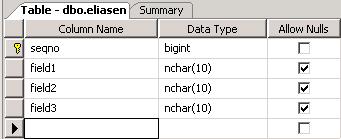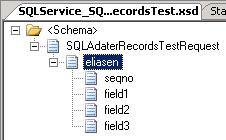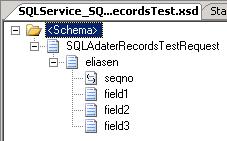Hi
When generating a schema based on the SQL Adapter, there are some options for manipulating the XML.
I always use the "for xml auto, elements" version, because I'm an "element-kind-of-guy". Others use the "for xml auto" for several reasons:
- It is the default
- Attributes create smaller XML
- They like attributes
None the less, I'm an "element-kind-of-guy" and I do what I want! :-)
Anyway, the schemas that are the result of this leave my schema with loads of records instead of elements, meaning that I can not promote the result to distinguished fields.
There is a way of changing this, though... allthough I really don't consider it to be a nice solution :-)
As an example, I have the following table in a database:

And I have this stored procedure to get the values:
CREATE PROCEDURE [dbo].[Get_eliasen]
AS
BEGIN
-- SET NOCOUNT ON added to prevent extra result sets from
-- interfering with SELECT statements.
SET NOCOUNT ON;
-- Insert statements for procedure here
SELECT * from eliasen for xml auto, elements, xmldata
END
Basically, it returns all rows from the table. The schema generated from this stored procedure will look like this:

The "seqno", "field1", "field" and "field3" are records and not elements. If I want to change them to be elements instead, I need to open the XSD in a text editor and do this manually:
As an example, I will change the record "seqno" into an elements.
The original XSD looks like this:
<?xml version="1.0"?>
<xs:schema attributeFormDefault="unqualified" elementFormDefault="qualified" targetNamespace="http://eliasen.dk/SQLAdaterRecordsTest" version="1.0" xmlns:xs="http://www.w3.org/2001/XMLSchema">
<xs:annotation>
<xs:appinfo>
<msbtssql:sqlScript value="exec [Get_eliasen]" xmlns:msbtssql="http://schemas.microsoft.com/BizTalk/2003" />
</xs:appinfo>
</xs:annotation>
<xs:element name="SQLAdaterRecordsTestRequest">
<xs:complexType>
<xs:sequence>
<xs:element minOccurs="0" maxOccurs="unbounded" name="eliasen" xmlns:q1="http://eliasen.dk/SQLAdaterRecordsTest" type="q1:eliasenType" />
</xs:sequence>
</xs:complexType>
</xs:element>
<xs:complexType name="eliasenType">
<xs:choice minOccurs="0" maxOccurs="unbounded">
<xs:element name="seqno" xmlns:q2="http://eliasen.dk/SQLAdaterRecordsTest" type="q2:seqnoType" />
<xs:element name="field1" xmlns:q3="http://eliasen.dk/SQLAdaterRecordsTest" type="q3:field1Type" />
<xs:element name="field2" xmlns:q4="http://eliasen.dk/SQLAdaterRecordsTest" type="q4:field2Type" />
<xs:element name="field3" xmlns:q5="http://eliasen.dk/SQLAdaterRecordsTest" type="q5:field3Type" />
</xs:choice>
</xs:complexType>
<xs:complexType name="seqnoType">
<xs:simpleContent>
<xs:extension base="xs:long" />
</xs:simpleContent>
</xs:complexType>
<xs:complexType name="field1Type">
<xs:simpleContent>
<xs:extension base="xs:string" />
</xs:simpleContent>
</xs:complexType>
<xs:complexType name="field2Type">
<xs:simpleContent>
<xs:extension base="xs:string" />
</xs:simpleContent>
</xs:complexType>
<xs:complexType name="field3Type">
<xs:simpleContent>
<xs:extension base="xs:string" />
</xs:simpleContent>
</xs:complexType>
</xs:schema>
And I will change it into this:
<?xml version="1.0"?>
<xs:schema attributeFormDefault="unqualified" elementFormDefault="qualified" targetNamespace="http://eliasen.dk/SQLAdaterRecordsTest" version="1.0" xmlns:xs="http://www.w3.org/2001/XMLSchema">
<xs:annotation>
<xs:appinfo>
<msbtssql:sqlScript value="exec [Get_eliasen]" xmlns:msbtssql="http://schemas.microsoft.com/BizTalk/2003" />
</xs:appinfo>
</xs:annotation>
<xs:element name="SQLAdaterRecordsTestRequest">
<xs:complexType>
<xs:sequence>
<xs:element minOccurs="0" maxOccurs="unbounded" name="eliasen" xmlns:q1="http://eliasen.dk/SQLAdaterRecordsTest" type="q1:eliasenType" />
</xs:sequence>
</xs:complexType>
</xs:element>
<xs:complexType name="eliasenType">
<xs:choice minOccurs="0" maxOccurs="unbounded">
<xs:element name="seqno" type="xs:long" />
<xs:element name="field1" xmlns:q3="http://eliasen.dk/SQLAdaterRecordsTest" type="q3:field1Type" />
<xs:element name="field2" xmlns:q4="http://eliasen.dk/SQLAdaterRecordsTest" type="q4:field2Type" />
<xs:element name="field3" xmlns:q5="http://eliasen.dk/SQLAdaterRecordsTest" type="q5:field3Type" />
</xs:choice>
</xs:complexType>
<xs:complexType name="field1Type">
<xs:simpleContent>
<xs:extension base="xs:string" />
</xs:simpleContent>
</xs:complexType>
<xs:complexType name="field2Type">
<xs:simpleContent>
<xs:extension base="xs:string" />
</xs:simpleContent>
</xs:complexType>
<xs:complexType name="field3Type">
<xs:simpleContent>
<xs:extension base="xs:string" />
</xs:simpleContent>
</xs:complexType>
</xs:schema>
So what have I done?
- I Found the definition of the record "seqno". It was based on the type "q2:seqnoType".
- I found where the "seqnoType" type was declared, and noted that it extended "xs:long".
- I changed the type of "seqno" from "q2:seqnoType" to be "xs:long".
- I removed the q2 namespace declaration from the seqno element, as it was no longer needed.
- I removed the "seqnoType" type declaration, as it was no longer needed.
That's it. Save the XSD and reload it in your schema editor - you will get this:

But it sure would be nice to have the option of just changing it in the properties of an elements in the schema editor...
Hope this helps someone.
EDIT on the 4'th of march 2007: Remember also that the record just below the root node must be set as "maxOccurs=1" instead of unbounded. Otherwise, you can not promote the fields below the record, obviously.
--
eliasen